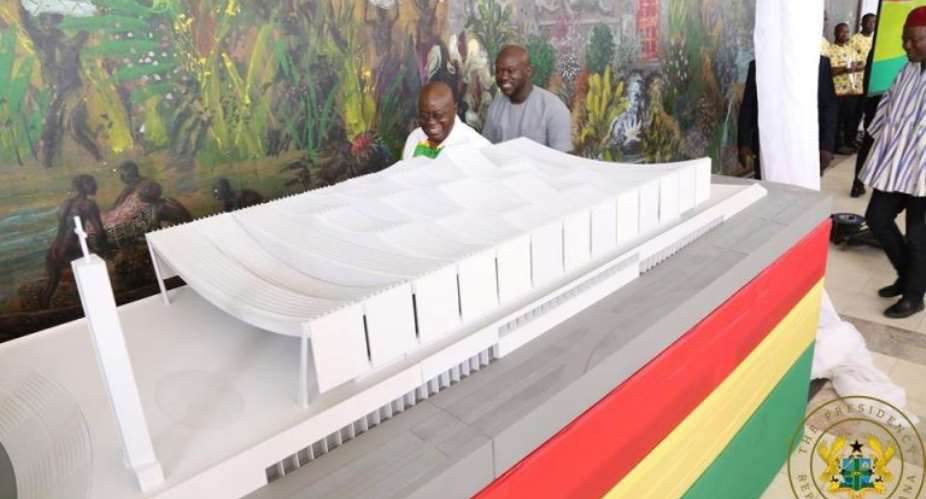Cathedrals, in the past ages, were built by religious figures or institutions as a reflection of faith. Such religious buildings were constructed with the effort of the community members who express such a faith. In essence, cathedrals were built as houses of God, to reflect his glory. Cathedrals, primarily, are the seat of the Bishop or the house of God. The construction of a national cathedral in Ghana, as a secular state, using state resources is problematic.
The construction of a cathedral, to a large extent, should be Church-led and financed by those who lead the Church. Hence, the state only participates in the construction of the edifice for the Church through donations or the provision of a seed capital for its construction. With this, the Church, as a group, takes a lead role in the mobilisation of the funds or resources to finance the project. Therefore, the Church must take a keen interest in the mobilisation of the financial resources for the building of the cathedral, the house of God or the seat of the Bishop.
The building of a cathedral is not within the responsibilities of the state. The attempt of the state to facilitate the construction of the cathedral must have limits in financing. It will be a totally misplaced priority to consider the project a state-owned or a public-private partnership. The foundation for the construction of the cathedral, in finances, can be laid by the state beyond which it cannot and must not act.
Cathedrals are projects of the Church in many countries. In Ghana, the Church has assumed an unusually deviant character, which the state had planned to regulate in the past, though failed to execute its plan. It is surprising therefore to know the state plans to construct a meeting place for the Church that has engaged in indecent religious activities some of which are damaging to the health of the people, and the norms of decency in the country.
The Church in Ghana helps in the delivery of health care services through the building of hospitals, clinics, CHPS compounds etc. The Church equally builds schools and other facilities that augment the efforts of the state in the delivery of quality welfares to the masses. Therefore, the provision of a seed capital for the construction of a cathedral is appropriate but it must not be done at the expense of other projects.
It is not immediately demanding for the construction of the cathedral. Thus, the state needs to cap the amount it is providing as seed capital for the project, and allow the Church and its leaders to mobilise the required funds to finance the project. There should not also be timelines for the completion of the project, after all God is not homeless. In the Church-age, God does not dwell in temples or cathedrals.
As a non-denominational Christian worship centre in Ghana, the Church (as a group) needs to have a properly planned scheme to mobilise a greater portion of the money required to put up the cathedral. Cathedrals are mostly built globally by churches through donations.
God will not be pleased with the state if it shirks its responsibility of providing hospitals, school infrastructures, markets, good road networks, electricity, water and other essential amenities that directly affect the lives of people who will glorify God eventually.
Cathedrals are not state-owned assets like schools, hospitals, markets and business enterprises. Globally, they are considered as private assets that are owned by the Church. Unless the cathedral in Ghana is meant for tourism purposes, it does fit in the nomenclature of a state asset. Ghana as a secular state must not engage in activities that demonstrate a special likeness for a particular religious sect.
Emmanuel Kwabena Wucharey
Economics Tutor, Advocate and Religion Enthusiast.





 This IMANI job no dey pap; the people you are fighting for are always fighting y...
This IMANI job no dey pap; the people you are fighting for are always fighting y...
 Prof. Naana Opoku-Agyemang has changed; you can see a certain sense of urgency –...
Prof. Naana Opoku-Agyemang has changed; you can see a certain sense of urgency –...
 MFWA Executive Director slams Akoma FM for engaging in ‘irresponsible’ media pra...
MFWA Executive Director slams Akoma FM for engaging in ‘irresponsible’ media pra...
 ‘Women must become millionaires too’ — Prof Jane Naana on establishment of Women...
‘Women must become millionaires too’ — Prof Jane Naana on establishment of Women...
 Some believe only in Ghanaian votes, not Ghana — Kofi Asare jabs politicians
Some believe only in Ghanaian votes, not Ghana — Kofi Asare jabs politicians
 Plan to make BEST sole aggregator of Sentuo Oil Refinery will create market chal...
Plan to make BEST sole aggregator of Sentuo Oil Refinery will create market chal...
 2024 elections: I can't have the man I removed from office as my successor — Aku...
2024 elections: I can't have the man I removed from office as my successor — Aku...
 2024 Elections: Immediate-past NPP Germany Branch Chairman garners massive votes...
2024 Elections: Immediate-past NPP Germany Branch Chairman garners massive votes...
 Gov’t focused on making Ghana energy self-sufficient, eco-friendly – Akufo-Addo
Gov’t focused on making Ghana energy self-sufficient, eco-friendly – Akufo-Addo
 April 25: Cedi sells at GHS13.74 to $1, GHS13.14 on BoG interbank
April 25: Cedi sells at GHS13.74 to $1, GHS13.14 on BoG interbank
